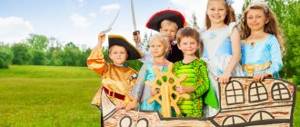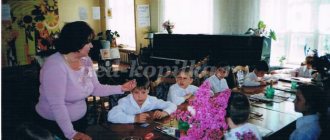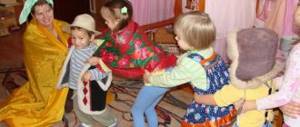By participating in such activities, schoolchildren have to:
- perform various social roles;
- express different civic positions;
- organize or influence the actions of other participants;
- establish communication links, establish contacts;
- resolve conflict situations that arise during the game.
During the game, a relaxed atmosphere is established. Its organic course includes natural command and submission, which children do not perceive aggressively.
Role-playing as a means of developing communication skills
Communication in the game is spontaneous; schoolchildren have to develop a model of behavior that involves the formation of the following communication skills:
- willingness to cooperate;
- tolerance;
- tolerance for other people's opinions;
- ability to conduct dialogue;
- ability to find a compromise solution.
During the game, relationships are established between children, which they then reproduce in real life. The children learn techniques and rules of communication that they can later use in similar life situations. Playing out the situation several times gives students the opportunity to change roles, try other behavior options, and reflect on their activities.
Article on the topic “The use of gaming technologies in primary school lessons. Role-playing game"
MUNICIPAL AUTONOMOUS EDUCATIONAL INSTITUTION BUNKOVSKAYA SECONDARY SCHOOL
Article on the topic
“APPLICATION OF GAME TECHNOLOGY IN LESSONS IN PRIMARY SCHOOL. ROLE-PLAYING GAME"
Prepared
primary school teacher
Popova Lyubov Alexandrovna
S. Bunkovo
2016
The use of gaming technologies in primary school lessons.
Role-playing game
For a child, studying in primary school is one of the most important steps in preparing for an independent adult life. This is why many parents are anxious about choosing a school and teacher for their child. After all, students require a lot of effort and patience. And this, in turn, determines the requirements for the professional competencies of the teacher. Nowadays, every teacher must master different teaching and educational technologies.
The beginning of schooling means a transition from play activity to educational activity as the leading activity of primary school age, in which the main mental new formations are formed. But educational activities are not given to the child in a ready-made form. It must be formed. An extremely important issue is the ability to learn for yourself. The first difficulty is that the motive with which a child comes to school is not related to the content of the activities that he must perform at school. The motive and content of educational activity do not correspond to each other, so the motive gradually begins to lose its power. “Although the motive for socially necessary activities remains as a general motive, the content that the child is taught at school should motivate him to learn,” believed the famous teacher D.B. Elkonin. To maintain the motive for learning and the formation of educational activity in the student, it is necessary to introduce game-based learning technology in lessons in the primary grades. The game will help you actively gain knowledge without harming the student’s health. Therefore, the relevance of the topic is beyond doubt.
One can give many examples from leading teachers and psychologists about the great importance of play in childhood. The main confirmation of the need to play at this age has historical roots; since ancient times, people have passed on their life experiences through play, learned to accept a role, fulfill it, following established rules, make mistakes and express their opinions, correct each other’s behavior in the game, etc.
“Play is an important method, and it is somewhat mistaken to consider play as one of the child’s activities, since in childhood play is the norm, and the child must play even when doing serious work. His whole life is a game.” A.S. Makarenko.
“A game is a huge bright window through which a life-giving stream of ideas and concepts about the world around us flows into the child’s spiritual world. Play is the spark that ignites the flame of inquisitiveness and curiosity.” V.A. Sukhomlinsky.
The concept of “game technologies” in pedagogy includes a broad group of methods and techniques for organizing the pedagogical process in the form of various games.
Unlike ordinary games, a pedagogical game is a clearly defined learning goal and a corresponding pedagogical result, which can be identified explicitly and have an educational and cognitive orientation. The game form of classes is created in lessons with the help of game techniques and situations; they encourage students to engage in learning activities.
The goal of gaming technology is to make the learning process entertaining, create a cheerful working mood in children, and make it easier to overcome difficulties in mastering educational material.
The place and role of gaming technology in the educational process, the combination of game and learning elements largely depend on the pedagogical game chosen by the teacher. These can be physical (motor), intellectual (mental), labor, social and psychological games.
In such lessons, students work more actively. Even those who are reluctant to study or are closed and shy in everyday life are liberated, work with great passion, and often show their talents.
Working under the “Primary School of the 21st Century” program, I had great opportunities to express creativity through gaming technologies. The authors of the program closely link the development of creativity with the improvement of such a mental process as imagination, therefore, for the first time in elementary schools, the educational center has developed a system for using role-playing games in teaching, which makes it possible to develop various facets of role-playing behavior, and therefore the imagination and creativity of the student. Role-playing has been introduced as a mandatory structural element of the lesson on “The World Around us,” especially in grades 1 and 2. My children like lessons in which they transform into different images, while the perception of educational material occurs in the game through the child’s feelings.
In 1st grade, the most exciting thing is the role-playing game. It facilitates easy adaptation of a first-grader to new learning conditions. Role-playing play helps the child realize the right to his or her individuality. The attractiveness of the game lies in the personal involvement of the participants, the factor of surprise, the ability of players to influence the development of events and other properties inherent in the game (excitement, interest). Role-playing is acting out or performing a specific role. For younger schoolchildren, the game begins with an agreement, with joint planning of who will play who, and the main questions are now “Does this happen or not?” Thus, children learn social relations through play. The process of socialization is noticeably smoothed out, children gradually join the team.
Let me give you a few examples of such games.
The world around us 1st grade.
Lesson "Forest meeting".
Goal: To be able to distinguish between seasons: name the basic living conditions of plants and animals. Know and name migratory birds.
This lesson is preceded by preparatory work, which consists of the fact that in previous lessons the children went on an excursion to the park, observed autumn changes in nature, in a literary reading lesson they became acquainted with works about preparing animals for winter, visited the library, etc.
During the lesson, the teacher introduces the topic “Forest Meeting” and offers a task: choose an animal, insect or bird whose role they will play. You can use animal hats. At the “meeting” the players sit in a circle. A chairman is selected to lead the “meeting.”
It is possible that several people will choose to play the same character. You can invite them to join a group and perform together, complementing each other. According to the script, those gathered can ask clarifying questions to any character, express their wishes, and correct each other if necessary. At the end of the “meeting” a conclusion is made: are all the animals ready for winter?
While conducting such a lesson, in my class the plot of the game sometimes unfolded simply unexpectedly. The “bunny” cried because the winter was cold and his fur coat was light. “Wolf” believed that meat for the winter could be bought in the store. Other “animals” suggested what to do. But we always tried to proceed from what should be in reality.
The world around us 1st grade.
Lesson "Family"
Goal: Know your family members. Be able to write a story about your family. Be able to distinguish between basic moral and ethical concepts (sympathy, hard work, laziness, obedience - disobedience, indifference).
The first part of the lesson is spent talking with children about who lives in their family.
A family is people who cannot always live together, but they never forget to take care of each other. And most importantly, they are relatives to each other.
In the past, families were always large. In the 18th century, in Shuisky district, 241 km from Moscow, 69 children were born into the family of peasant Fyodor Vasilyev. They were born 27 times, and not once was 1 child born. They had 16 twins, 7 triplets and 4 quadruplets.
And now the largest Russian family, with 20 of their own children, lives in the Novousmansky district of the Voronezh region. They are listed in the Guinness Book of Records as the largest family in Russia (1.074 million in the country).
— Do we have large families in our class?
-What should a real family be like?
Student answers.
— Now we will play the game “Family”
Next, children choose roles in accordance with the topic of the lesson and act them out.
At the end of the lesson, we sum up: did the members of the family we created like to live the way we came up with? What feelings did we experience while playing our role, what would we like to change, and most importantly, what a real family should be like. Students can speak freely or can choose and continue with any sentence.
In today's lesson I learned...
In this lesson I would praise myself for...
After the lesson I wanted...
Today I managed...
The world around us 1st grade.
Lesson “New Year's holiday. Role-playing game"
Goal: Participation in a holiday show (role-playing game, staged action). Be able to tell a New Year's story on behalf of the chosen role.
Based on the goals of the lesson, children are asked to choose a role the day before, prepare attributes, and even come up with a short story on behalf of their character, and perhaps make small gifts or surprises for classmates with their own hands.
This lesson provides a huge field for creative activity. The main thing here is the creation of positive emotions, a sense of unity in the children's team, the joy of communicating with peers.
A prerequisite when playing role-playing games with students is entering or immersing yourself in the game (problem), an approximate game scenario and exiting the game.
Input is setting lesson goals. The teacher himself must be as prepared as possible in the area in which he is going to conduct the role-playing game. It would seem difficult to organize a role-playing game - an environment must be created that is conducive to the unfolding of the plot. In fact, what a game is all about is that you can improvise and replace most of the real details with imaginary ones. An important role in organizing a role-playing game is given to staged preparation, however, if role-playing games are regularly carried out in the educational process, such preparation will not be needed. After two or three successfully performed role-playing games, the entire production will consist of assigning roles and writing a draft script; otherwise, you can completely rely on improvisation. The exit from the game is the outcome of the game. This is both a gaming and educational-cognitive result. Students jointly analyze the course and results of the game, the relationship between the game model and reality, as well as the course of educational and game interaction.
In elementary school, it is more advisable to start using gaming technologies in the form of a role-playing game when organizing a lesson or element of a lesson on the subject “The world around us.” By the time they start school, preschoolers have experience in role-playing behavior in games, some knowledge of the surrounding reality, and this also has a positive effect on the rapid adaptation of first-graders and creates conditions for maintaining interest among students who are poorly motivated to study or have difficulties in communicating.
Role-playing in mathematics lessons can act as preparation for independent or test work. Various subjects may appear here, ranging from a banal trip to a store or cafe, to an upcoming home renovation with the calculation of the necessary building materials and financial expenses, which is the acquisition of vital universal skills for modern children.
Unforgettable lessons can be literacy lessons, where children come to the birthday of a new letter. At the same time, they bring her not only gifts in the names of which this letter is written, but also her portraits with unusual additions: ornamental decoration, fantastic elements, etc.
By playing in class, children are convinced that learning is really interesting. Games stimulate mental activity, develop memory, imagination, attention, cognitive interest in the subject, elevate mood and create a situation of success for each student, help overcome passivity in the classroom and enhance performance. For a teacher, this is an effective means of cultivating cognitive processes and activating students’ activities.
Bibliography
Bespalko V.P. Pedagogy and progressive teaching technologies. - M., 1995.
Vygotsky L.S. Pedagogical psychology. M., Pedagogy. 1991.
Vygotsky L. S. Game and its role in the psychological development of a child // Questions of psychology, 1966. No. 6.
Elkonin D.B. Psychology of the game. M., 1999.
Mental development of children
Play activities play a huge role in the process of mental development of children. The emotional component of the gameplay is also important, because the most vivid traces in our memory are left by those events that hurt our feelings and cause a strong emotional reaction.
Thus, play activities enable the child to gain invaluable personal life experience in the most comfortable conditions for him. It can be called a creative laboratory of self-education, a “school of life” for a child.
The essence and structure of role-playing and business games
Role-playing and business games are of a social nature. Their essence lies in the artificial immersion of children into conditions that are possible in real life. The main thing in conducting such games is to give children the opportunity to take initiative and present their model of social relations.
Younger schoolchildren already have an idea of how adults behave in similar situations. Therefore, despite the freedom of action offered, in most cases children try to copy their behavior. The task of the game organizer is to encourage the children to find their own options for behavior and non-standard solutions to emerging problems.
The structure of this type of game is quite inconsistent. On the one hand, during the game the child should feel absolutely free. On the other hand, the course of the game is strictly regulated:
- the range of roles that schoolchildren must play has been determined;
- the conditions and environment in which imaginary events occur are indicated;
- the rules of the game that must be followed are described;
- There are moral and ethical guidelines that participants are required to use.
Types of pedagogical games
Materials » Game technology at school » Types of pedagogical games
Page 1
Gaming technologies have been used in education since time immemorial. Currently, they are more often used in primary education. Gaming technologies are rarely used in middle and high schools. Games can be used when getting to know each other in the initial stages of learning; can be combined with various psychological and pedagogical trainings on communication development. They can also be used directly in the learning process.
Games should be divided by type of activity into physical (motor), intellectual (mental), labor, social and psychological.
Classification of pedagogical games:
Based on the nature of the pedagogical process, the following groups of games are distinguished:
A) teaching, training, controlling and generalizing;
B) cognitive, educational, developmental, socializing;
C) reproductive, productive, creative;
D) communicative, diagnostic, career guidance, psychotechnical, etc.
The typology of pedagogical games is extensive according to the nature of the gaming methodology.
Three large groups are: games with ready-made “hard” rules; “free” games, the rules of which are established during the course of game actions; games that combine the free element of play and rules accepted as the conditions of the game and arising during its course.
The most important of other methodological types; subject, plot, role-playing, business, simulation and games - dramatization.
According to the content of games with ready-made rules, they are distinguished: all subject, sports, mobile, intellectual, construction and technical, musical (rhythmic, round dance, dance), therapeutic, correctional, comic, ritual and ritual, etc.
“Freestyle” games are distinguished by the area of life that they reflect: military, wedding, theatrical, artistic, everyday games in the profession, and ethnographic.
There are games with and without objects, tabletop, indoor, outdoor, on the ground, computer and with TSO, as well as with different means of transportation.
Form is a way of existence and expression of content. Based on their form, independent typical groups are distinguished, in which the following games: games - festivals, game holidays; gaming folklore; theatrical play actions; game trainings and exercises; game questionnaires, questionnaires, tests; variety game improvisations; competitions, contests, confrontations, rivalries; competitions, relay races, starts; wedding rituals, gaming customs; hoaxes, practical jokes, surprises; carnivals, masquerades; game auctions, etc.
Pedagogical games have an essential feature - a clearly defined learning goal and corresponding pedagogical results, educational and cognitive orientation.
The game form of classes, which is created using game techniques and situations, allows students to activate their cognitive activity.
When planning a game, the didactic goal turns into a game task, the educational activity is subject to the rules of the game, the educational material is used as a means for the game, the element of competition is introduced into the educational activity, which transforms the didactic task into a game one, and the successful completion of the didactic task is associated with the game result.
Pages: 1
New articles:
Technology Yu.L. Troitsky Neither traditional teaching technologies nor problem-based learning technologies imply the development of creative principles in children in the search for objective historical knowledge. In these systems, the unconditional dominance of the reproductive method of assimilation of the author's textbook knowledge prevails. But the material...
Certification as a mechanism of state control over the quality of education Certification and state accreditation are a mechanism of state control over the effectiveness of the educational process carried out by preschool educational institutions; provide stimulation for their activities in the direction of improving the quality of preschool education; way...
Dynamics of the level of development of speech competence at a given level At the end of the formative result, a final cut was carried out, similar to the ascertaining cut. Test. 1. Fill in the missing words. A verb is a part of speech that means and answers questions? ?… 2. Among these words, underline only the verbs. Hand, looking, breeze, gentle, breaking, reading...
What is a role-playing game?
Role-playing games are always a game of “something” or “someone”. The basis of such a game lies in the content of the roles that children must “try on” for themselves. The following types of roles are possible:
- specific adults or children;
- representative of a certain type of profession;
- family roles;
- ethnographic;
- roles of fairy-tale or literary heroes.
Each child should play his role only within the framework of a play action, which can be aimed at:
- substantive reconstruction of the content of the activity;
- building a system of relationships between people in the course of activities.
Types of role-playing games in elementary school
A distinctive feature of role-playing and business games is the presence of a plot. You can use the following types of plots:
- creative;
- related to the profession;
- related to discovery;
- route, i.e. trips;
- related to art;
- paramilitary;
- fabulous;
- fantastic.
Involving children in role-playing or business games allows them to go beyond their context of activity, realize the need for interpersonal communication and master the necessary key competencies.
Examples of using role-playing and business games in elementary school
Let's look at examples of what role-playing games can be done with primary schoolchildren. Let's start with those games where it is proposed to play the role of children. The value of such games is that children are given the opportunity to try out different options, play out several models of behavior and, based on this, determine the most optimal and correct one.
Game "Planet of Friends"
First, the teacher invites the children to unite in several groups and describes the game situation to them. We will talk about endless space, in which there are many planets. Each team is invited to settle on a separate planet. The essence of the game will be to establish life in an uninhabited area. Children, taking turns completing the teacher’s tasks, must develop and equip their state. The tasks are as follows:
- Come up with a name for the planet and its inhabitants. Describe what they should look like.
- Draw up rules for living together on the planet.
- Describe what events are happening on the planet.
- Offer options for solving the described situation if it happened on your planet.
"But what if?" Olga Tikhomirova
After all groups have expressed their options for behavior in such a situation, it is necessary to conduct a collective discussion and formulate general rules of communication between children.
At the end of the game, it is necessary to invite children to move from a fantastic situation to real events.
Students need to describe:
- what situation they lost;
- what topic was touched upon;
- How can you apply the rules expressed during the game in the life of your class?
Children must express and reinforce the rules of communication in the classroom. You can choose a group of children to write down and document these rules, and then post them in the classroom corner.
Of course, children are most interested in games in which they play the role of adults. The following options are possible.
Game "Zoo"
To play such a game you will need to prepare a large amount of equipment:
- figurines of various animals;
- material for building enclosures (building kits or cardboard boxes can be used);
- natural material to create a park effect;
- box office tickets.
Children must be divided into several groups and a zoo director and a cashier must be selected separately. The point of the game is to build a zoo and organize a tour around it.
First, each group has to choose an animal to look after. You can do this in any order, by lot, or offer to solve riddles.
While this action is taking place, the zoo director must think over the location of each enclosure and draw a schematic map. After the groups are distributed, he gives each of them building material. While the groups are building enclosures, the director will have to beautifully design a map of the zoo and outline a tour route around it.
The main part of the game is that children must not only place the animal in an enclosure, but provide it with care. The children are asked to find information on how to feed their animal and what conditions to create for it. You can spend two or three days on this and continue the game after the students are ready.
All information that children manage to collect will need to be voiced during the virtual excursion. For this purpose, each group selects its own guide. The rest of the children buy tickets at the box office and go for a walk to the zoo. They all move around the zoo in one group and near each enclosure they listen about who lives here.
This game can be used in environmental classes. During the game, children will become familiar with the rules of behavior in the zoo and learn a lot of information about rare animals.
At events dedicated to studying the Rules of the Road, you can conduct role-playing games “Road traffic”, “I’m going home”, “We are at a pedestrian crossing”, etc.
Game "Journalists"
First, the title and thematic feature of the magazine are announced. An editor-in-chief is selected from among the students in the class. He can be appointed or determined by a vote of all members of the team.
You also need to tell the children that there are several thematic departments in the editorial office of the magazine and explain the features of the work of each of them. Students should think about which department would be more interesting for them to work in. Allocation to departments can also be carried out in the form of a full-fledged role-playing game, when children need to write a job application, pass an interview and receive an appointment order.
After all organizational aspects have been completed, it is necessary to begin simulating the work of the editorial office. Children are offered a topic for the issue and each department must prepare material and submit it for publication. An editorial board must be selected that will check the material’s compliance with the topic and design requirements.
The result of such a game should be the release of printed materials. When offering children such a game, it is worth thinking about its practical significance. Therefore, the topic of the issue should be selected in accordance with the topic being studied in class or extracurricular activities. The produced magazine must be used at the final collective event. Moreover, it is not enough just to show it; you need to view and analyze each page. At the end, you should thank all the editorial staff and, perhaps, “pay” their salaries.
The themes of such games are very diverse. You can invite children to work in a confectionery factory, pizzeria, hairdresser, store, clinic or post office. With the help of these games, schoolchildren will understand the characteristics of each profession.
Types of didactic games according to the level of activity of primary school students.
Types of didactic games by level of activity
primary school students.
A didactic educational game brings the child’s new cognitive activity closer to what is already familiar to him and facilitates the transition from play to serious mental work. It activates mental processes, arouses in students a keen interest in the process of cognition, makes it possible to make any educational material exciting, and causes deep satisfaction in the student.
Didactic games provide an opportunity to develop in students the arbitrariness of such processes as attention, memory, observation, and contribute to the formation of educational skills and abilities, learning new material or repeating and consolidating what has been learned, i.e. solve certain didactic problems. Game tasks have a positive effect on the development of ingenuity, resourcefulness, and intelligence. Many games require only mental, but also volitional efforts: organization, endurance, and the ability to follow the rules of the game. In the game, students willingly overcome difficulties, develop the ability to analyze their activities, evaluate their actions and capabilities.
Pedagogical games have the following classification
:
- by type of activity
: physical, intellectual, labor, social and psychological;
- by the nature of the pedagogical process
: teaching, training, controlling and generalizing; cognitive, educational, developmental; reproductive, productive, creative; communicative, diagnostic, career guidance, etc.;
- by the nature of the gaming methodology
: subject, role, simulation, etc.;
- by gaming environment
: with objects, without objects, computer and with TSO, room, etc.
Types of didactic games.
- Games - exercises. They improve students’ cognitive abilities, help consolidate educational material, and develop the ability to apply it in new conditions. Examples of games and exercises: crosswords, puzzles, quizzes.
- Games - travel. These games promote comprehension and consolidation of educational material. The activity of students in these games can be expressed in the form of stories, discussions, creative tasks, and the expression of hypotheses.
- Games - competitions. Such games include all types of educational games. Students compete in teams.
Didactic game for elementary school students
on mastering the sound composition of a word.
By the time they start school, most children have fully mastered the rules of sound pronunciation, have a fairly comprehensive vocabulary, and are able to construct sentences grammatically correctly. However, not everyone's literacy process is the same.
Examples of games in lessons in primary school
Mathematics
Story-based games on professional topics may not be so complex, but reproduce only individual elements of work activity. For example, in a math lesson you can invite children to play the game “Fishermen”. They receive fishing rods, imitate baiting, and throw the hook “into the water.” Students take turns catching fish with examples written on them. After a successful catch, you need to complete the task received.
Russian language
Another example of using a business game in a Russian language lesson. This is the game "Postman". The postman comes into the classroom and says that he has letters for the students in the class. Children receive letters (you can reproduce the situation of receiving a registered letter). Then the students open the envelopes and take out cards with a task for independent work.
We invite a fairy-tale hero
Children like to take part in games with a fairy-tale or fantasy plot. The easiest way to use such games is to invite a fairy-tale hero to the class, who invites the children to complete his tasks. For example, Dunno may ask you to teach him how to come up with poems. Little Red Riding Hood can give schoolchildren cakes on which tasks are written (words with missing letters, terms whose meaning needs to be explained, etc.).
Game activities in mathematics lessons in primary school.
In turn, gaming activities, depending on the content of the material, the method of organization, the level of training of younger schoolchildren, and the goals of the lesson, can take on a different character, for example, they can be productive, reproductive, creative, constructive, practical, educational.
Based on the characteristics of the subject of mathematics, one should distinguish between competitive games and olympiad games. In the first case, victory is ensured mainly due to the speed of calculations, transformations, and problem solving, but without compromising the quality of the task. In the second, victory is ensured mainly due to the quality of solutions to problems of increased complexity. The first ones are useful for developing automaticity of actions, the second ones are useful for instilling a serious attitude towards mathematics in children.
Ultimately, in game forms of classes, the ideas of joint cooperation, competition, self-government, education through the team, introducing younger schoolchildren to scientific and technical creativity, instilling everyone’s responsibility for learning and discipline in the classroom, and most importantly teaching mathematics, are realized.
Chapter 2. Methodological principles for organizing gaming activities when solving problems in mathematics lessons in 1st grade.
2.1. Analysis of the educational complex “School of Russia” for 1st grade on the use of game activities in solving problems in mathematics lessons.
One of the most famous projects of the Prosveshchenie publishing house in the country is the educational and methodological complex for primary grades “School of Russia”. The educational complex “School of Russia” is built on fundamental principles that are common to all academic subjects, has full program and methodological support and guarantees continuity with preschool education.
The leading goal and the main means of its implementation, which form the basis of the educational complex “School of Russia”, are aimed at providing modern education for primary schoolchildren in the context of the requirements of the Federal State Educational Standard. A powerful educational resource is the information and educational environment of the educational complex “School of Russia”, which includes: a concept, work programs, a system of textbooks that form the core of the IOS, as well as a powerful methodological shell, a variety of electronic and Internet resources.
The educational and methodological complex “School of Russia” is built on conceptual foundations common to all academic subjects and has complete software and methodological support. Positive conclusions have been received from the Russian Academy of Education and the Russian Academy of Sciences on the “School of Russia” textbook system and all completed subject lines included in it.
The complex implements the Federal State Educational Standard for Primary General Education and covers all subject areas of the Federal State Educational Standards curriculum. The educational complex “School of Russia” was developed in accordance with modern ideas, theories of a general pedagogical and specific methodological nature, providing a new quality of both the educational and methodological complex as a whole, and the significance of each academic subject separately. At the same time, the educational complex “School of Russia” carefully preserves the best traditions of the Russian school, which have proven their effectiveness in the education of primary school students, providing both real opportunities for the personal development and upbringing of a child, and the achievement of positive results in his education.





